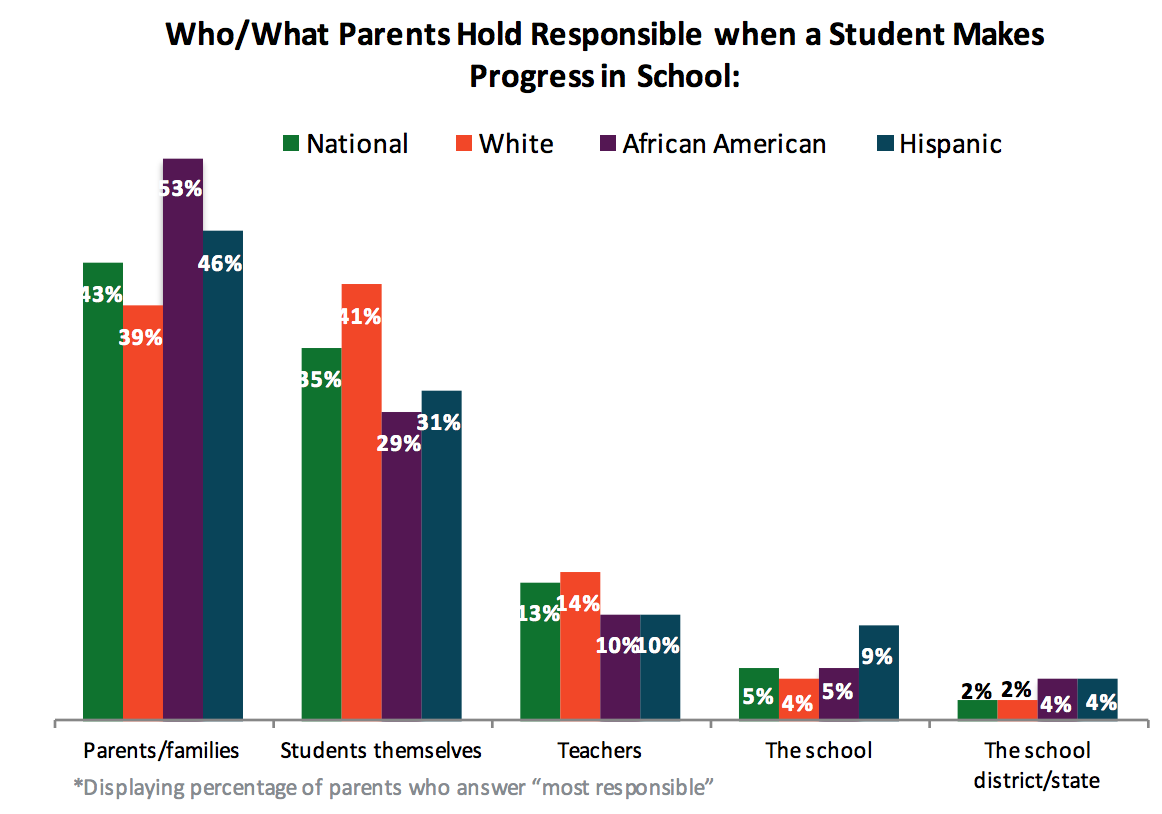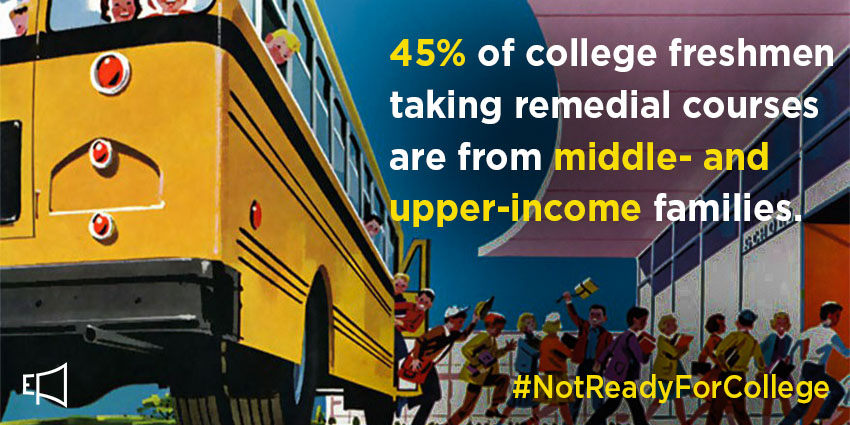
Apr 13, 2017 12:00:00 AM
 And yet, parents don’t really think schools or teachers have a big hand in determining if a child is learning. In a
2015 national poll of more than 1,000 parents nationwide, Education Post asked, “Who is most responsible if a student is making progress in school.” Forty-three percent said “parents/families” and 35 percent said “the students themselves.” Just 13 percent said “teachers” and just 5 percent listed “the school.” All told, barely 1 in 5 parents hold teachers, schools, districts or states “most responsible” for a child’s learning. And, when given a long list of “concerns,” the number one concern among all groups—Black, White and Hispanic—was, “Parents are not as involved in their child’s education as they should be.” So, parents say they value accountability and will do anything to get a good education for their kids, but they don’t hold anyone responsible for outcomes by exercising the most effective form of accountability in their control—strategically voting on the issue. The failure to hold elected officials responsible for school quality trickles down to the entire system. Voters don’t make politicians pay, and politicians do not make school systems pay. Few schools or educators face consequences for low performance.
And yet, parents don’t really think schools or teachers have a big hand in determining if a child is learning. In a
2015 national poll of more than 1,000 parents nationwide, Education Post asked, “Who is most responsible if a student is making progress in school.” Forty-three percent said “parents/families” and 35 percent said “the students themselves.” Just 13 percent said “teachers” and just 5 percent listed “the school.” All told, barely 1 in 5 parents hold teachers, schools, districts or states “most responsible” for a child’s learning. And, when given a long list of “concerns,” the number one concern among all groups—Black, White and Hispanic—was, “Parents are not as involved in their child’s education as they should be.” So, parents say they value accountability and will do anything to get a good education for their kids, but they don’t hold anyone responsible for outcomes by exercising the most effective form of accountability in their control—strategically voting on the issue. The failure to hold elected officials responsible for school quality trickles down to the entire system. Voters don’t make politicians pay, and politicians do not make school systems pay. Few schools or educators face consequences for low performance.
 Meanwhile, about
1 in 5 students never graduates from high school; 2 out of 3 who do graduate are
not ready for college; among those who go to college,
1 in 4 needs to retake high school classes at their own expense; and 40 percent of college students
do not finish within six years, costing parents, students and taxpayers billions. Education is arguably the most important investment society makes. It’s the surest path to the American Dream for people of every race and background. Every problem we face, from joblessness and crime to racism and even obesity, can be better addressed through education. Successful graduates contribute to society. Unsuccessful students carry costs.
So, is politics the problem or the solution? Let’s vote on it. https://twitter.com/edu_post/status/852546122858065921
Meanwhile, about
1 in 5 students never graduates from high school; 2 out of 3 who do graduate are
not ready for college; among those who go to college,
1 in 4 needs to retake high school classes at their own expense; and 40 percent of college students
do not finish within six years, costing parents, students and taxpayers billions. Education is arguably the most important investment society makes. It’s the surest path to the American Dream for people of every race and background. Every problem we face, from joblessness and crime to racism and even obesity, can be better addressed through education. Successful graduates contribute to society. Unsuccessful students carry costs.
So, is politics the problem or the solution? Let’s vote on it. https://twitter.com/edu_post/status/852546122858065921
Peter Cunningham is the founder of Education Post and serves on its board. He served as Assistant Secretary for communications and outreach in the U.S. Department of Education during the Obama administration’s first term. Prior to that he worked with Arne Duncan when he was CEO of the Chicago Public Schools. Peter is affiliated with Whiteboard Advisors, a DC-based education policy, research and communications firm. He serves on several non-profit boards, including Oakland-based Great Schools, which provides school quality information to parents through a national online platform, The Montessori School of Englewood, a Chicago public charter school, Manufacturing Renaissance, a career education program that trains public high school students for jobs in manufacturing, Unbounded, an organization supporting teachers in schools that are transitioning to higher standards, and Foolproofme.com, which is focused on financial literacy for students. Peter founded Cunningham Communications, serving public, private and nonprofit clients, worked for political consultant David Axelrod, and was a senior advisor and speechwriter for Chicago Mayor Richard M. Daley. A native New Yorker, Peter began his career as a journalist with small weekly newspapers in New York. He earned an M.S. in Journalism from Columbia University and a B.A. in philosophy from Duke University. He is married to artist Jackie Kazarian, and they have two adult children who are proud graduates of the Chicago Public Schools. Peter joined the Education Post board in 2018 after stepping down as the organization's Executive Director. Meet our board →
The story you tell yourself about your own math ability tends to become true. This isn’t some Oprah aphorism about attracting what you want from the universe. Well, I guess it kind of is, but...
If you have a child with disabilities, you’re not alone: According to the latest data, over 7 million American schoolchildren — 14% of all students ages 3-21 — are classified as eligible for special...
The fight for educational equity has never been just about schools. The real North Star for this work is providing opportunities for each child to thrive into adulthood. This means that our advocacy...
Your donations support the voices who challenge decision makers to provide the learning opportunities all children need to thrive.
Ed Post is the flagship website platform of brightbeam, a 501(c3) network of education activists and influencers demanding a better education and a brighter future for every child.
© 2020–2024 brightbeam. All rights reserved.
Leave a Comment